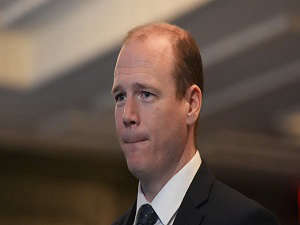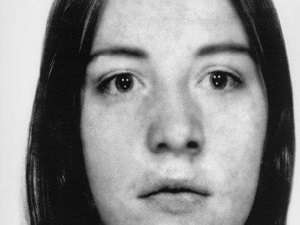
By Rebecca Black, Press Association
A soldier who went on to take his own life said he wanted to be in a minor road crash to get some rest, an inquest has heard.
Rifleman Darren Mitchell, 20, from London, was found hanged in his room at Abercorn Barracks in Ballykinler, Co Down on February 10, 2013.
His death came three months after 30-year-old Lance Corporal James Ross, from Leeds, was also found hanged in his room at the base on December 8, 2012.
Both men were serving with the Second Battalion the Rifles and had previously been on active service in Afghanistan.
An inquest at Ballymena court house is examining both the deaths.
It heard from Rifleman Mitchell's girlfriend Cher Kiff on Monday.

(Cher Kiff, girlfriend of Rifleman Darren Mitchell, attends an inquest into his death at Ballmena court house in Co Antrim)
She told the inquest that following a false alarm pregnancy, the pair had been talking about getting engaged and having children.
Ms Kiff described Rifleman Mitchell as someone who "radiated warmth" and could "cheer anyone up".
She said she had noticed a change in him in the months before his death, describing him as exhausted due to courses he was taking to become an adventure training instructor and suffering from panic attacks.
"He made a remark about a car accident, wishing for a non-serious accident to be able to rest and build himself up," she told the inquest.
Ms Kiff told the inquest that she had urged Rifleman Mitchell to seek help for his panic attacks and asked him if he had ever had suicidal thoughts, but she said he brushed it off and said he would never do that because he loved his mother too much and because he was a Christian.
"He made a remark about a car accident, wishing for a non-serious accident to be able to rest and build himself up," she told the inquest.
"He was not acting himself while he was home, kept having panic attacks. The way he reassured me, I just thought he was feeling down but I didn't think he would do anything like that."
She also revealed that in January 2013, a medic had told Rifleman Mitchell's boss he might be depressed and to keep an eye on him.
The inquest saw Whatsapp conversations between the pair in the 24 hours before his death.
In one, Rifleman Mitchell said: "I spend 90% of my time on my own, I hate my life".
It also heard that Rifleman Mitchell posted a message on his Facebook page before he died saying, "tonight's the night".
Ms Kiff was tearful as she recalled how he told her he loved her before he stopped responding to texts.
Last week the inquest heard evidence from Rifleman Mitchell's mother Carol Mitchell that a "perfect storm" of factors had led to her son's death.
"He thought everyone was leaving, he was exhausted, his back pay hadn't come through, he had had a row with Cher and he had just got back after being away for a long time," she told the inquest, adding that she did not blame the Army for his death, but felt more could have been done to help him.
Earlier on Monday, the inquest heard from a soldier who had been based at Ballykinler in 2013, via video link from Leeds court house.
Soldier D was a friend of Rifleman Mitchell and one of three who found him dead in his room. He later was one of several soldiers who were involved in self-harming in that period.
The three were sent to another barracks in Lisburn for a week, twice, to help them cope with their loss.
Soldier D claimed that Corporal Mark Farragher accused him and his two friends of "bluffing" to get out of work due to their trips to Lisburn.
When asked how it had made him feel he replied: "Horrible, they were meant to be there to help you, and talk to, when they are doing that, there is no one to talk to".
He also detailed another incident during which he said Company Sergeant Major Roger Webb had called him a "selfish dick" in the guardroom after he had self-harmed.
Philip Aldworth, counsel for the Ministry of Defence, put to Soldier D that other higher ranking officers had been supportive, and that he had received medical attention and support from the army.
The inquest also heard about issues with paperwork within Second Battalion the Rifles.
There is no record of whether Lance Corporal Ross or Rifleman Mitchell received the full post operational aftercare support following deployment in Afghanistan.
Coroner Joe McCrisken told the inquest this underlines the importance of record keeping.
The inquest continues.


 Kneecap announce new song ahead of headline performance at London’s Wide Awake
Kneecap announce new song ahead of headline performance at London’s Wide Awake
 Gordon Lyons to attend first GAA match as Stormont Communities Minister
Gordon Lyons to attend first GAA match as Stormont Communities Minister
 Fresh appeal over 1973 murder of 18-year-old whose body was found in quarry
Fresh appeal over 1973 murder of 18-year-old whose body was found in quarry
 Kneecap say terror charge is ‘carnival of distraction’ and ‘political policing’
Kneecap say terror charge is ‘carnival of distraction’ and ‘political policing’
 Woman assaulted while jogging in West Belfast
Woman assaulted while jogging in West Belfast